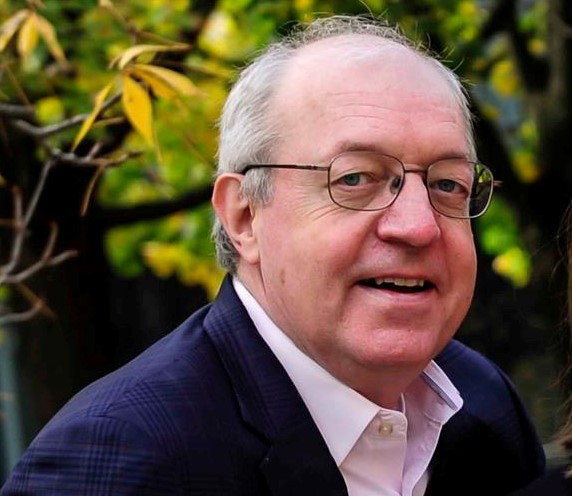
By Greg O’Brien
TORONTO – The Canadian broadcasting industry lost one of its leading thinkers and a “friend to all” on Monday when Gary Maavara died of cancer. He was 68.
His career in broadcasting spanned more than 40 years with CTV, Canwest and Corus Entertainment where he spent time on with just about every division, including legal, operations, engineering, sports, and government relations.
“Broadcasting was in his blood,” said John Cassaday, who was Maavara’s boss both at CTV and later at Corus, in an interview on Wednesday. “He loved it. He was pulling cable at CFTO as a teenager and pulling cable at the NBC affiliate in Boston when he was going to school down there. He pursued broadcasting with a passion.” Maavara’s father-in-law was broadcasting pioneer Jack Ruttle, who recently passed away.
Maavara started his career as a lawyer and then was hired away as a vice-president with CTV. He was executive producer of the official film of the 1988 Calgary Olympic Winter Games (which won an Emmy Award), and later was chief of engineering during CTV’s broadcast of the 1992 Barcelona Olympics, then CTV’s vice-president sports where he led the broadcaster’s 1994 Lillehammer Olympics broadcast – and then later helped earn the license for and launch CTV Sportsnet. He was also chief legal counsel, VP operations and engineering, and group VP programming during his time at CTV.
the 1988 Calgary Olympic Winter Games (which won an Emmy Award), and later was chief of engineering during CTV’s broadcast of the 1992 Barcelona Olympics, then CTV’s vice-president sports where he led the broadcaster’s 1994 Lillehammer Olympics broadcast – and then later helped earn the license for and launch CTV Sportsnet. He was also chief legal counsel, VP operations and engineering, and group VP programming during his time at CTV.
At CanWest he spent six years in a variety of executive and operating roles, including COO Interactive, and senior VP specialty television. In 2004 Maavara rejoined Cassaday at Corus as executive VP and general counsel and was corporate secretary until he stepped down in October 2019.
Maavara was always on the lookout for the new and never stopped learning, said his friends. In fact, he insisted on what became the first CTV webcast, of the 1996 World Figure Skating Championships in Edmonton. Of course, it was live text and not video, but it was cutting edge then “and lo’ and behold, we had people from all over the world tapping into our webcast of the figure skating championships,” recalls Cassaday.
Maavara is also remembered as someone who could see challenges from many angles and who was adept at truly understanding others’ points of view in order to reach an agreement, even if it wasn’t exactly what his company wanted, but something that respected everyone’s needs. “He was a very important player in the construction of the new Corus… and bridging the Cassaday era to the Murphy era,” said Corus CEO Doug Murphy in an interview Wednesday. “He was an honest broker and a straight shooter which I find these days there’s fewer and fewer of those around.
“One of his great skills was to be able to walk a mile in someone else’s shoes. He did have the ability to see a situation from different perspectives and that is what we really need, so hopefully those of us who were inspired by Gary continue to draw on that approach,” added Murphy, who laughed about how Maavara could sometimes take a while to summarize his point of view.
“The infamous Maavara minute, we he used to call it,” said Murphy about the way his friend sometimes closed meetings. “He would wind up with the ‘Maavara minute’, which always meant it’s going to be the ‘Maavara millennium’, I used to tease him about.”
Maavara mentored many in the industry, too – and even patiently taught this reporter a thing or ten about how the broadcasting business works. We at Cartt.ca will miss him dearly.
“What sticks with me is his willingness to provide advice and counsel to anyone,” added Cassaday. “He was a friend to many and an advisor to many and he did that all without any expectation of any return of favor. It was all completely generous… And he had just an incredible work ethic. I mean, he truly was a man for all seasons with his understanding of operations and engineering, sports rights, intellectual property, regulatory affairs, he had it all.”
Maavara was also creative in his own right with a passion for photography (the images you see here are borrowed from his Facebook page), the outdoors and motorsports. He was able to combine his love of photography and motorsports as he became the official photographer of some race events.
outdoors and motorsports. He was able to combine his love of photography and motorsports as he became the official photographer of some race events.
“Gary Maavara was an incredible, diversely talented human being,” added friend and former Vision TV CEO Bill Roberts. “We shared a love for Montreal, sports, broadcasting, and wilderness trails, but he knew more about Donald K Donald, the Alouettes, car racing, the policies and practices of media, photography, and a host of other subjects, than anyone I ever met.
“As a friend he was unwavering, as a mentor he was extraordinarily generous, as a hiking buddy in our 20 years or so of Grand Canyon adventures he always had your back,” continued Roberts.
“He had a mighty sense of humour… his hilarious readings from Cosmopolitan magazine around the campfire sent everyone into tipsy stitches.
“A hiking and broadcasting friend of ours, upon hearing of Gary’s death, wrote that he’d seen an eagle soaring on the thermals over a distant ridge line that morning, and knew instantly that Gary had passed. There was that kind of wonderful, special magic about Gary Maavara too,” said Roberts.
“He is much missed… we’ve lost one of the very best.”
Maavara is survived by his wife Lisa, and children Taylor, Scott, and Alec. A small family memorial will take place this week with a larger gathering to be planned at a later date. Pease click here for his official obituary.
In 2019, Maavara posted the following to his Facebook page and we thought it would resonate well with Cartt.ca readers because cancer touches most of our families and friends and it shows what kind of helpful, honest, genuine guy he truly was.
Some Thoughts on Living with Cancer
By Gary Maavara
It is over three years since my cancer diagnosis. I have learned a great deal since then and thought I would share some of it. I hope it is helpful.
This is also a work in progress so let me know what you think even if you think it is junk. I can handle the feedback.
I apologize in advance for the trite statements.
It is about me so it might not be right for you, which brings me to my first point.
#1. Everyone is different.
Cancer is one of those afflictions that come with statistics. People and statistics might tell you will only live for another ____ months, years, days, etc. There is a ____ % chance of a cure.
Blah blah blah.
These numbers are all averages or means or mediums or mid points etc. Statistics are also a description of an aspect of the past. They are built on information that is usually at least a year old. And the statistics are not about you.
So don’t use the statistics as a solid road map. You may be worse or better than the average but the only person who matters is you.
Science meanwhile continues to march forward. Our knowledge and treatments are evolving quickly. So the measures of what happened in the past might not be the roadmap for you. Your focus should be on your future.
#2. Our bodies are complex.
This is related to my first point. We are enormously complex entities and my experience is that everyone’s disease has some attributes that are similar and some that are not.
There are an estimated 30 trillion cells in each person. So, imagine the number of combinations of differences. Remember that everyone is different. So knowing about how other people with the same disease are doing is helpful but the variables are so numerous and weighted in various ways.
So sharing information is important but don’t use it as a measure. Focus on yourself. What is happening to others is good to know but it’s not a map or a bobsled run.
#3. You are the boss.
The medical system can be intimidating and having cancer does not make that any easier.
But it’s your body and your life. So follow advice but remember always that you are in charge. If something is not clear, ask. If something does not seem right, figure out how to make it so.
In my case my first doctor made a diagnosis that was just plain wrong. I endured a few months of intense pain before I went to get another opinion. I was almost too late.
Sometimes getting a second opinion is a waste of time. But it can also reduce anxiety. And maybe it’s not about getting another opinion but simply checking references. I did that and found out that my current team is the best on a world measure.
Your body will do the job of healing. Be sure that you are comfortable with the advice and the treatments you are getting about how to do that. Don’t be shy to ask about other treatments. And ask what the medical words mean. There are plenty of them.
The best approach is to think of your illness as a management challenge that requires a special task force. Get all kinds of advice from your team but remember that the final decisions are yours to make.
#4. Stay away from the Internet.
Ask lots of questions and ask the medical people to explain things. But using the Internet for research can really take you down some rabbit holes and cause needless stress. Yes, get informed, but don’t try to be your own doctor.
For example, when I first got what was a dire diagnosis, my medical team asked me if I wanted to try an experimental treatment. They gave me a couple of days to think about it and of course I went home and got on the web. I found an important study that said that the average benefit of the proposed drug was a 17-day increase in life span.
I went back very depressed and told the team that I would pass as it was not worth it to anyone to try for an additional two weeks.
I got a nice smile from the team leader who said, “You have been on the Internet.”
And then he proceeded to talk to me in a gentle way about my points # 1 and # 2 and that it was a statistical report done by an economist and I had to remember that the experiment was used on people who were in real trouble. He explained that they figured I would get another 12 months and by then maybe something else would be available.
I am happy to report that he was right. My treatment started to fail but they had something new to try 12 months later.
That said, the Canadian and U.S. Cancer Society sites and the Mayo Clinic are pretty good, but they can’t give detailed advice because everyone is different and treatments are evolving quickly. They also need to worry about legal liability about specific statements.
Get expert advice about whatever you face that is tailored to you. Most often you can find this for free. Most hospitals have services and counselling available. There are also volunteer support groups that are happy to help you.
If you do use the Internet, discuss what you find with a professional on what it means before you jump to conclusions. Remember point #2 about the complexity of our bodies.
#5. Form a Team, Listen to Your Medical Team, and Keep Track.
Deciding when to tell others can add to the strain of the first news. I know that some people are afraid of their employers. In my case I worked for a great company of people who had the policies and the attitude to help me. If that is not available, try to develop a small cadre of people (starting with your buddy) to talk with and sometimes to do stuff. Again, I am forever indebted to many people, starting with my wife and my sisters, who get me through some challenging and dark days.
This may seem obvious but you also need to have a discipline for listening and keeping track. In my case my ears stopped working about six words after the doctor said, “you have a serious cancer…” It was a shock and I am sure he had lots of other important things to say but I missed it all.
Having a buddy to come with you, as a second set of ears, is important especially when you are hearing bad news. This is crucial at the start. In my case I was lucky to have a lovely wife who really knows her way around medical cases based on a variety of family experiences.
Take notes as much as you can. Your buddy should too. It really becomes important.
Each of us “hears” and understands different things. So it really helps to have others with you so you can compare notes. If no one is with you, ask the doctors if you can review what they said in your words. This will clarify in your mind what they said and it also helps them to be sure that you comprehend what they said. This can be crucial when deciding on the next steps course of treatment.
Assume the medical team does not remember much about you. The volume of people they see makes this difficult. And you will see different or new people who don’t know you. Sure, they have a file but it gets fatter over time and they simply don’t have the time to review it all each time.
So keep a diary. I do an entry after every appointment so it runs in reverse order. Note everything, as something that seems trivial to you might be important for the doctors. I update an executive summary at the top of the document with the latest situation report, drugs, doctors etc. that I can print off and bring with me each time.
Listen to your body and note things. Keep track of this along with your clinic notes. Prepare carefully for each doctor visit.
These days we are lucky to see what the medical people are writing about us as much is online. Check that carefully for typos and mistakes. They happen and they can be crucial to someone looking at your file.
Of course having a significant person with you such as a spouse means that they hear the information directly. That can really help you manage the process.
#6. It is a mind and body energy game.
Try to stay happy and calm. We are all going to die. Cancer may take you quicker but the best revenge is to enjoy each day before that. Part of this joy will come from being nice to and helping others. You have joined a great club. People with cancer are special in so many ways.
Be nice to everyone, especially the medical people. They know you are sick and they do care a lot but their workload is endless. And they see and hear more sad stories than good ones. Respect their coping mechanisms.
Cancer can also take your thinking down some really dark alleys. Worry and fear can cripple you. I dealt with that by keeping my mind occupied as much as possible. I had work. But that was another form of stress so I needed something else. I got away from the electronic screens in my life and read all the books about D-Day 1944 that I could find and compared the perspectives. A sad subject but I like history and it kept me away from dark thoughts.
 There is also lots of expert advice on coping with this type of stress. And I am happy to recommend three books that I use every week.
There is also lots of expert advice on coping with this type of stress. And I am happy to recommend three books that I use every week.
When I was first diagnosed I struggled with a huge range of topics including telling people, “arranging my affairs” (as the doctor suggested), and coping with the other stresses of living.
Living with cancer takes energy when you feel like you have less of it. It is scarce so you need to manage it carefully.
Peter Jensen is a wonderful person who has helped the Canadian Olympic team for decades to manage their energy and their thoughts. I first met him in the early 90’s when we hired him to help our broadcast team prepare for the coverage of the 1992 Barcelona Olympics. We had never done a summer games before and the people at the CBC were delighting in telling everyone, especially our team, that we would fail. And we were nervous. We needed to shed the anxiety and perform at our best.
Peter helped our team succeed.
Just after I was diagnosed in August 2016, I met Peter at a company retreat. I was stressed beyond belief about my family, my job, etc. I went up to him after his presentation and we said our hellos. I shared my sad news and he gave me some great advice.
One thing he said that day was that I needed to start acting like a dog if I felt tired. Dogs find a corner and take a nap whenever they feel tired. Those naps have really helped me.
The good news is that he has written a great book called “Thriving in a 24-7 World: An Energizing Tale about Growing through Pressure” by Peter Jenson, Ph.D., iUniverse, 2015.
The great thing about cancer is that it challenges you to perform at your highest level. The biggest obstacle to that is anxiety. Of course, anxiety is the thing that stands in everyone’s way to successful performance. In sports we call it choking.
But you can manage your anxiety and there is a great book to help you with that too.
Years ago I was lucky to meet Jacques Dallaire, Ph.D. at Mosport, where he was advising racing drivers on how to manage their anxiety to stay focused. His work intrigued me and I came to realize that it could help me as well.
Some more good news is that he wrote a great book, “Performance Thinking – Mental Skills for the Competitive World and for Life!” by Jacques Dallaire Ph.D. 2012. You can find it at www.performanceprime.com
This book has real world practical advice to help you. I have seen how major racing drivers like Helio Castroneves talk about the benefits of what Jacques says. 2019 The Indy 500 winner Simon Pagenaud is one of his clients.
This book has become a tool that I consult often to help myself and others to cope with challenges.
The third area is attitude. Stay optimistic. I look at my cancer as a gift as well as a challenge. It has caused me to learn things about friends, my family, society, and myself that I would have never known without being a member of what I call the Club.
There is a great book written by a leader in the medical field of optimism.
“Learned Optimism – How to Change Your Mind and Your Life” by Martin Seligman Ph.D. Vintage Books (Random House) 2006.
Seligman talks about the research in the field and even about cancer. It also has tips about helping your kids and your organization to become optimistic.
#7. Get fit.
Just do it. Get some exercise. Get a trainer if you can afford it or take classes with people. It took me a long time to do this as my skeleton is covered in lesions and is weak. But I finally got started and I am so happy I did it. Don’t wait!
Good fitness will help you mentally and physically. That’s not news but I forgot as I started this journey.
#8. Remember the Other Stuff.
Your cancer team will be focused on your disease. That said there are lots of other parts of your body that need care. So make sure you go to the dentist and see the optometrist. Talk to your family doctor about other things. Sometimes they can help you make sense of the cancer information too.
Just make sure you treat the other parts of your body. Doing so will help with the cancer challenge.
#9. It is a waiting game so put it to good use.
Any medical situation means that you are going to spend time waiting. Waiting for tests to be done. Waiting for examinations and consultations. Waiting for prescriptions and waiting for bureaucracies.
So be strategic about it. People will usually be able to tell you how long the wait will be to allow you to go exploring.
For example, there is always a clean and quiet bathroom in a hospital. Find it. Your mind and body will thank you.
Find the quiet places to sleep or meditate.
Find out where people hang out. I had a situation where the pharmacy would not release my drugs because they needed to talk to the doctor. I took the pharmacist to where the doctors chill out. She was thrilled to find out about it.
Wander around and learn where everything is. It will benefit you on the day when you need to get there fast.
It’s also fun and you can help others too, which is a bonus.
#10 Miscellaneous Stuff (in no order of importance).
- Share your experience. I was helped enormously by people who had been through the cauldron. Some of these people have died and I remain in enormous debt for how they helped me. They died knowing it.
- Drink a lot of plain water.
- A sauna before and after chemo really seems to help, if only to relax you.
- Get SAXX or other comfortable underwear.
- The hospital double gown tactic: Put the first one on like you would a coat, tie it, and then put the second one on back to front. This means that don’t need to tie the front one. This sounds simple but I watch people struggle all the time. I have spent 106 days at the hospital over the last 41 months so I have lots of experience on this.
- Speaking of clothing, wear casual cotton clothes without buttons etc. to appointments where you will be examined or treated. This sometimes means no need for a hospital gown.
- A button shirt can seem like forever when you are doing it with a medical professional waiting for you.
- Bring layers. Chemo is cold. Wear long sleeves to cover the test tracks.
- Don’t go to chemo or other invasive treatments by yourself if you can help it. If you do go alone, take an Uber or a cab.
- Say thank you. Often.
- Be patient and park your ego. Big egos don’t do well in a hospital gown.
- Have fun when you can. Maintaining a sense of humour can help ease the hurt.
#11. Final Thoughts: Live Your life.
Remember that you are loved.
And remember that your loved ones are struggling too so help them back as you can.
But whatever happens keep living your life.
Never give up. You are stronger than you think.


